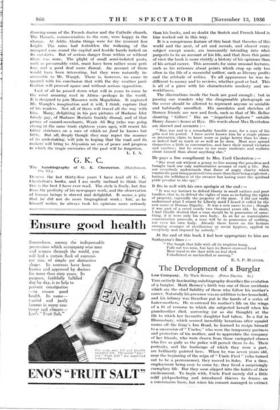The Autobiography of G. K. Chesterton. (Hutchinson. fid:)
G. K. C.
DURING the last thirty-five years I have read all G. K. Chesterton's books, and I am 'really inclined to think that this is the best I have ever read. The style is lively, but free from the prolixity of his newspaper work, and the observation of 1 an beings is shrewd and delightful. It seems a pity that lie did not do more biographical work ;'- but, as he- himself writes, he always took his opinions more seriously
than his books, and no doubt the Scotch and French blood in him worked out in this way.
It is a conspicuous feature of this book that theories of this world and the next, of art and morals, and almost every subject except music, are incessantly intruding into what
purports to be an account of his life, and that from this point .
of view the book is more strictly a history of his opinions than of his actual career. This accounts for some unusual features, such as his reticence about ,points which crop up only too often in the life of a successful author, such as literary profits and the attitude of eritics. To all appearance he was in- different to money and to reviews, whether good or bad. This is all of a piece with his characteristic modesty and un-
worldliness. . .
The illustrations inside the are good enough ; but in passing one wonders why the disagreeable photograph on the cover should be allowed to -represent anyone so amiable and habitually unruffled. His anecdotes and sketches of literary friends are new and fresh, such as that of Mr. Belloc shouting " Gilbert " like an "impatient foghorn " outside Henry James's house at Rye. His words about Max Beerbohm are shrewd and accurate :—
" Max was and is a remarkably humble man, for a man of his gifts and his period. I have never known him by a single phrase or intonation claim to know more or judge better than he does ; or indeed half so much or so well as he does. Most men spread themselves a little in conversation, and have their unreal victories and vanities ; but he seems to me more moderate and realistic about himself than about anything else."
He pays a fine compliment to Mrs. Cecil Chesterton :-
" She went out without a penny tollive among the pennilessi and brought back our only authoritative account of .such a life. But not everybody understands that flame of angry charity which resents the poor being pestered even more than their being neglected ; hating the selfishness of the sweater but hating more the spiritual pride peculiar to the spy."
It fits in well with his own apologia at the end;— "It was my instinct to defend liberty in small nations and poor families, that is, to defend the rights of man as including the rights of property, especially the_property. of the poor. I did not ally understand what I Meant by Liberty imtil I heard it calle'd by the new name of Human Dignity. It was a new name to me ; though it was part of a creed nearly two thousand years old. In short, I had blindly desired that a man should be in possession of some* thing, if it were only his own body.. In so far as materialistic concentration proceeds, a man will be in possession of nothing, not even his own body. Already there hover on the horizon sweeping scourges. of sterilisation or social hygiene, applied to everybody and imposed by nobody."
At the end of this book I feel how appropriate to him are Santayana's lines :— • -
" The bough that, falls with all its trophies hung,
Falls not too soon, but lays its flower-crowned head
More royal in the dust with no loaf shed - Unhallowed or unchiselled or unsung."
E. S. I'. HAvNFs.














































 Previous page
Previous page